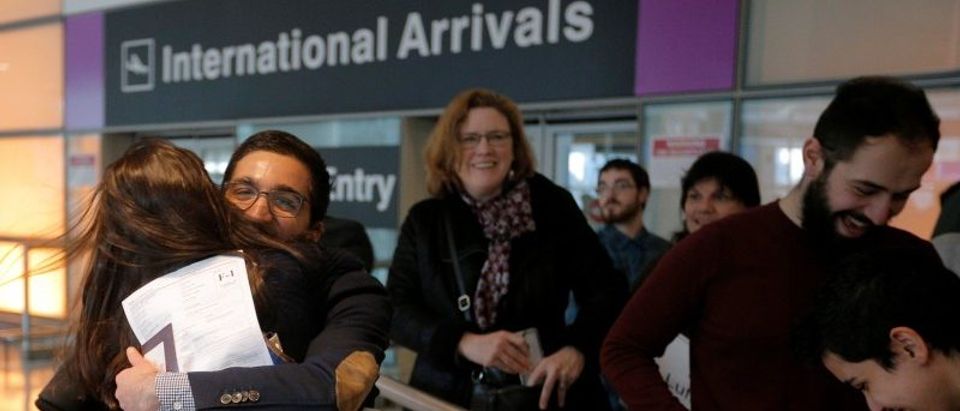In the midst of the presidential campaign of 2016, the man who would eventually win not only his party’s nomination but the presidency itself, Donald Trump, spoke consistently and passionately about the need to review and change US policy on immigration – including through “extreme vetting” of those wishing to enter the country. His reasons for this position were many, with issues such as economic stability and jobs creation for Americans being cited, but no justification was more frequently repeated nor more essential than the service of national security. Some thought he was kidding, full of the same vacuous hyperbole that permeates most people seeking political office, but now that Trump is President, one of his first actions was to make good on this campaign promise. By executive order, he has directed that immigration from seven nations – Iran, Iraq, Syria, Libya, Yemen, Sudan, and Somalia – be temporarily suspended, and that all refugees be blocked from coming to the US indefinitely.
Predictably, the political left was up in arms before the ink on the order had dried. Immigrant activist groups, the American Civil Liberties Union, and American media across the country have decried the move as a “Muslim ban” (because the nations on the list have populations that, by majority, happen to practice Islam) and called it un-American. In many cases, they’ve accused it of being flatly unconstitutional, contrary to the most basic values of the United States.
We should begin with what should be the most obvious point about President Trump’s order: it is not, in any way, a “Muslim ban”. It is a temporary restriction on incoming immigrants from certain high risk countries that have proven they themselves are, or are willing to harbor groups that, are a known threat to the safety of the people of the United States. These are nations that are openly hostile – by their governments, by their people, or both – to America and its interests. The fact that their people tend to be Muslims is entirely irrelevant. If terrorists with a thirst for American blood overwhelmingly originated from countries with majority Christian, Jewish, or Buddhist populations, the one wonders whether the media and other leftist organizations would feel that those religions were being targeted by this order.
It is worth noting that if this temporary travel restriction were intended as the “Muslim ban” as which it is being portrayed, then the absence of Indonesia and India – two nations that, together, hold nearly a quarter of the world’s total Islam-practicing population – from the exclusion list is noticeably odd.
Second, there is nothing un-American about keeping the US safe – not at least, unless leftist darling and former President Barack Obama is himself un-American. As President Trump has pointed out, Obama in 2011 banned all Iraqi refugees from entering the United States for six months, for national security reasons. Curiously, this fact is only weakly reported – or not at all – by the media as they fixate on Trump’s action.
An interesting case in the present discussion that exposes the hypocrisy of those crying out over the order is the nation of Iran. In that country, a large, peaceful majority Muslim population that is overwhelmingly progressive (and sympathetic to Western ideals and Western nations) with no desire to harm anyone via terrorism, is ruled by a brutal, repressive, and absolutist religious dictatorship that uses violence and other reprehensible tactics to squash political dissent among the people. Those who speak out are routinely arrested, tortured in custody, and even murdered. Yet the American media, and in many cases the world in general, barely covers or discusses the despicable measures used by the Iranian theocracy against its own citizens, for fear of appearing anti-Muslim. No, it only now, when the American President tries to enhance domestic security, that concern for the “freedom” of these people to travel suddenly becomes an issue. Where was the outcry when the Iranian government ruthlessly suppressed the Green Movement (a popular protest against a rigged election) and otherwise terrorized its people for years for the crime of insufficient political and religious orthodoxy? These activists do not care at all for the rights or well-being of Iranian people – or, by extension, any people at all.
It is appalling that after themselves being the victims of a vicious, murderous terror attack in 2001, and having witnessed other, similar attacks carried out in European countries and elsewhere since, the American people should be cast as villains for taking reasonable action to protect their safety. And let us make no mistake; it is the American people we are discussing here. A recent Quinnipiac poll has found that a plurality of Americans – 48 percent to 42 percent – support President Trump’s executive order. And there is no reason they should not, for it demonstrates nothing but a desire to have security and peace of mind – for themselves and their families — against terrorist attacks carried out by people from countries that have proven themselves a threat.
We do not lock our doors at night because we hate everyone outside. We do it because we love everyone inside.


